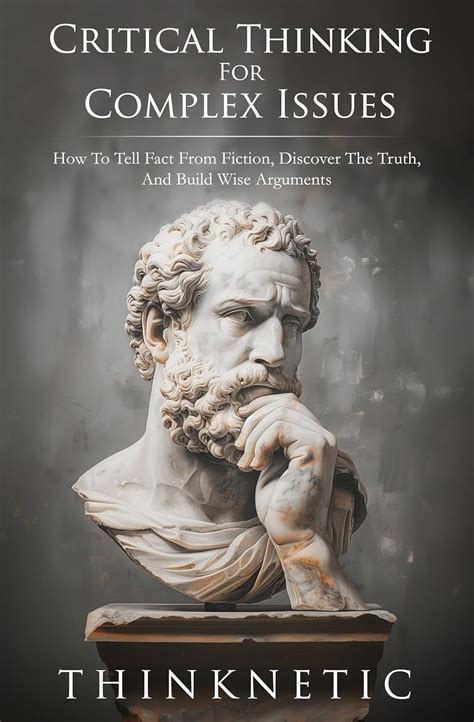In the realm of literature, critical reasoning takes center stage, enabling readers to dissect, interpret, and evaluate works of fiction with rigor and discernment. This article delves into the intricacies of critical reasoning in fiction, exploring its benefits and providing a comprehensive framework for applying it to literary analysis.

The Significance of Critical Reasoning in Fiction
Critical reasoning empowers readers to comprehend the multifaceted nature of fiction. It enables them to:
-
Understand the author’s intent: By examining the text’s language, structure, and symbolism, readers can discern the author’s purpose and message.
-
Analyze character development: Critical reasoning allows readers to delve into the motivations, actions, and relationships of characters, gaining insights into their evolution and the overall narrative.
-
Evaluate the plot’s complexity: Identifying the plot’s structure, conflicts, and resolutions allows readers to assess its pacing, tension, and coherence.
-
Identify literary devices: Critical reasoning facilitates the recognition of literary devices such as metaphors, similes, foreshadowing, and irony, enhancing the appreciation of the author’s craftsmanship.
-
Formulate personal interpretations: By engaging in critical reasoning, readers develop their own unique interpretations of the work, supported by textual evidence and nuanced understanding.
Statistics Underscoring the Benefits of Critical Reasoning in Fiction
-
According to the National Endowment for the Arts, individuals who participate in regular literary activities, which include critical reasoning, exhibit higher levels of critical thinking and decision-making abilities.
-
A study conducted by the University of California, Berkeley found that students who engaged in critical reasoning exercises while reading fiction demonstrated significant improvements in their analytical skills and comprehension.
A Framework for Applying Critical Reasoning to Fiction
To effectively apply critical reasoning to fiction, consider adopting the following framework:
1. Read Attentively: Pay close attention to every detail of the text, including the language, characters, plot, and setting. Note any inconsistencies or peculiarities that may hold significance.
2. Identify the Author’s Purpose: Examine the author’s background, intentions, and the context in which the work was written. This information can provide valuable insights into the author’s worldview and the themes they intended to explore.
3. Analyze Character Development: Study the characters’ psychology, motivations, and relationships. Consider the ways in which they evolve throughout the narrative and how their actions contribute to the overall plot.
4. Evaluate the Plot: Examine the plot’s structure, conflicts, and resolution. Identify any foreshadowing techniques or suspense-building elements employed by the author.
5. Identify Literary Devices: Recognize and interpret the use of literary devices such as metaphors, similes, imagery, and symbolism. These devices often enrich the text’s meaning and enhance its impact.
Tips and Tricks for Critical Reasoning in Fiction
-
Question everything: Challenge the author’s assumptions, motivations, and the logic behind their narrative choices. This will lead to deeper insights and a more nuanced understanding.
-
Take notes: As you read, jot down observations, questions, and connections you make. This will help you organize your thoughts and identify patterns.
-
Seek diverse perspectives: Engage with book clubs, online forums, or critical essays to gain different interpretations of the work. This will broaden your understanding and challenge your assumptions.
-
Don’t be afraid to re-read: Revisiting the text multiple times can reveal new details and insights that may have been missed during the initial reading.
Applications of Critical Reasoning in Fiction
Beyond literary analysis, critical reasoning in fiction can have practical applications in various fields:
| Field | Application |
|---|---|
| Education | Developing students’ critical thinking, analytical, and interpretation skills |
| Law | Evaluating evidence, building logical arguments, and understanding the intent of legal documents |
| Medicine | Interpreting medical research, analyzing patient data, and making informed decisions |
| Business | Analyzing market trends, evaluating business strategies, and making data-driven decisions |
| Entertainment | Critically reviewing movies, TV shows, and video games |
Conclusion
Critical reasoning is an indispensable tool for engaging with fiction in a meaningful and thought-provoking way. By applying the multifaceted framework outlined in this article, readers can deepen their understanding of literary works, develop their analytical abilities, and reap the many benefits critical reasoning has to offer both within and beyond the realm of literature. Embrace critical reasoning in your journey through fiction and unlock a world of rich and rewarding experiences.
Additional Resources
- The Critical Reader: A Guide to Literary Analysis by Laurence Perrine
- How to Read a Book by Mortimer J. Adler and Charles Van Doren
- The Norton Anthology of World Literature by Martin Puchner et al.
